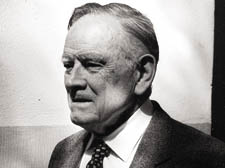|
|
 |
| |

Denzil Dunnett |
Denzil’s ‘Wounds’ are the poetry of a lifetime
Denzil Dunnett’s son James had no idea his father was a poet and contemporary of Dylan Thomas and Cecil Day-Lewis, writes Peter Gruner
Wounds by Denzil Dunnett, with drawings by Guy Hetherington, BookART. £12.99, available at the London Review Bookshop
ISLINGTON conservationist James Dunnett knew his father was a former journalist and diplomat but had no idea that he was also a distinguished Oxford poet.
His father Denzil, now 88, was extremely reticent about his youth when James was growing up, and never mentioned his poetry, or that he was a contemporary of Dylan Thomas and Cecil Day-Lewis, and a friend of the young Denis Healey (now Labour peer Lord Healey).
Now James, well known in the borough for his campaigns as a member of the Islington Society, has launched a new retrospective of his father’s work with a book of poetry, Wounds.
The title is clarified by a line from one of his father’s poems: “It is through wounds that we breathe…”
With examples of work written between the 1930s and 50s the book includes an introduction by Dr Ian Patterson, himself a poet and Fellow and head of English at Queen’s College, Cambridge.
The book is a remarkable evocation of the times when the poetic voices and influences of WH Auden and Stephen Spender dominated.
Born in 1917, son of an Indian civil servant, Denzil was chairman of the Oxford English Club and active in the Oxford Labour Club where he met Healey.
After the war he worked for the Scotsman newspaper and then the Foreign Office, where he was stationed in Bulgaria.
One of his poems is a moving tribute to a Reuters foreign correspondent, Benjamin Filchev, killed in 1951 presumably because he was against the communist rulers.
…Next week you disappeared. All that we knew
Was, when your wife went to the white-washed building
Which people shunned, and held up to the hatch
a parcel of food for you, they did not say/
You were not there.
They said come again next month...”
In On the Picture of a Starving Child, Dunnett presents a familiar story of Western guilt and discomfort with poverty.
You need everything.
Anything I send you someone will steal.
And I cannot give you anything
I have no right to address you.
Let me see, still, if it is possible
To be alongside, to be we in the face of the world.
They had no right to use your photograph.
They give you no fee for posing. Had they asked/ you would only have shaken your head. The team,
In suitably crumpled khaki, pale faces burnt red,
Stood their tripods and trimmed cameras
To focus on the queue for gruel and bread…”
Architect James Dunnett, currently embroiled in local conservation campaigns over Barnard Park and Ashmount School, said his father is not someone who likes to talk about himself. “It wasn’t until I was well into adulthood that I discovered a little of my father’s illustrious past.
“Throughout his life he has published occasional poems in magazines, but his first collection, Bird Poems, wasn’t published until 1989. Wounds brings together poems from throughout his life, grouped by theme, the first having originally appeared in the Oxford magazine Programme in 1935 and then in Nevil Coghill’s New Oxford Poetry, in 1937.”
Significantly, Denzil was also involved in what was called the Mass Observation movement of the mid 1930s and ’40s where people were asked to report everyday activities in an effort to understand how British society worked.
One of the experiments was a poem written collectively by 12 Oxford undergraduates including Denzil, which was published in the London magazine New Verse. Advertised on the front cover as the Oxford Collective Poem it was 18 lines and written by the group over several days.
Wounds ends with Epitaph:
Time burns all away,
Consumes his own
shadows,
But when you come,
Time,
To this tomb,
Pause.
Here lies one
Who looked you in the eye.
While she held your gaze
Our hands and our hearts were warmed byYour softer blaze.
|
 |
| |
|
 |
|


